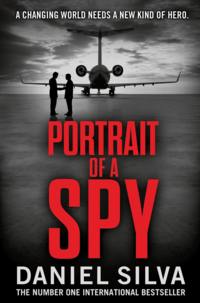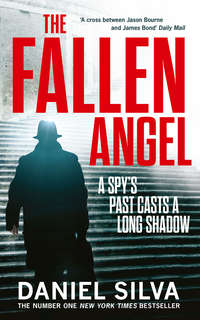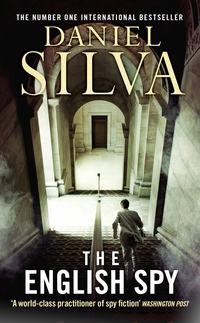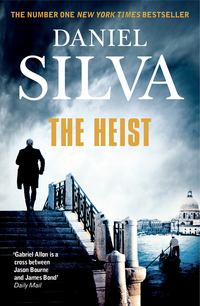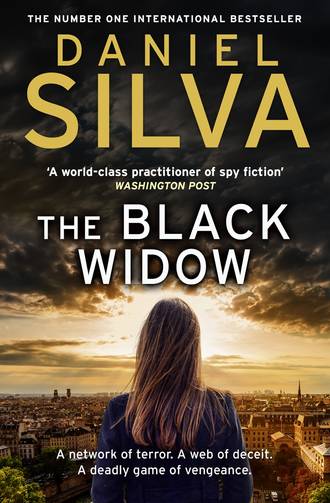
Полная версия
The Black Widow
“It’s a pleasure to finally meet you,” he said. “I only wish the circumstances were different. Madame Weinberg was a friend, was she not?”
Gabriel was silent.
“Is something wrong?” asked Rousseau.
“I’ll let you know when I see the van Gogh.”
“Ah, yes, the van Gogh. It’s in the room at the end of the hall,” said Rousseau. “But I suppose you already knew that.”

She had kept a key, Gabriel recalled, in the top drawer of the desk. Obviously, Rousseau and his men had not discovered it, because the lock had been dismantled. Otherwise, the room was as Gabriel remembered it: the same bed with a lace canopy, the same toys and stuffed animals, the same provincial dresser, above which hung the same painting, Marguerite Gachet at Her Dressing Table, oil on canvas, by Vincent van Gogh. Gabriel had carried out the painting’s only restoration, in a rambling Victorian safe house outside London, shortly before its sale—private, of course—to Zizi al-Bakari. His work, he thought now, had held up well. The painting was perfect except for a thin horizontal line near the top of the image that Gabriel had made no attempt to repair. The line was Vincent’s fault; he had leaned another canvas against poor Marguerite before she was sufficiently dry. Zizi al-Bakari, a connoisseur of art as well as jihadist terror, had regarded the line as proof of the painting’s authenticity—and of the authenticity of the beautiful young American woman, a Harvard-educated art historian, who had sold it to him.
Of this, Paul Rousseau knew nothing. He was staring not at the painting but at Gabriel, his cage bird, his curio. “One wonders why she chose to hang it here rather than in her parlor,” he said after a moment. “And why, in death, she chose to leave it to you, of all people.”
Gabriel lifted his eyes from the painting and fixed them squarely on the face of Paul Rousseau. “Perhaps we should make one thing clear at the outset,” he said. “We’re not going to be closing out old accounts. Nor are we going to take any strolls down memory lane.”
“Oh, no,” Rousseau agreed hastily, “we haven’t time for that. Still, it would be an interesting exercise, if only for its entertainment value.”
“Be careful, Monsieur Rousseau. Memory lane is just around the next corner.”
“So it is.” Rousseau gave a capitulatory smile.
“We had a deal,” said Gabriel. “I come to Paris, you give me the picture.”
“No, Monsieur Allon. First you help me find the man who bombed the Weinberg Center, and then I give you the painting. I was very clear with your friend Uzi Navot.” Rousseau looked quizzically at Gabriel. “He is a friend of yours, is he not?”
“He used to be,” said Gabriel coolly.
They fell into a comfortable silence, each staring at the van Gogh, like strangers in a gallery.
“Vincent must have loved her very much to paint something so beautiful,” Rousseau said at last. “And soon it will belong to you. I’m tempted to say you’re a very lucky man, but I won’t. You see, Monsieur Allon,” he said, smiling sadly, “I’ve read your file.”
10
RUE PAVÉE, PARIS
INTELLIGENCE SERVICES FROM DIFFERENT NATIONS do not cooperate because they enjoy it. They do so because, like divorced parents of small children, they sometimes find it necessary to work together for the greater good. Old rivalries do not vanish overnight. They slumber just beneath the surface, like the wounds of infidelities, forgotten anniversaries, and unmet emotional needs. The challenge for the two intelligence services is to create a zone of trust, a room where there are no secrets. Outside that room they are free to pursue their own interests. But once inside, each is compelled to lay bare its most cherished sources and methods for the other to see. Gabriel had much experience in this realm. A natural restorer, he had repaired the Office’s relations with both the CIA and Britain’s Secret Intelligence Service. France, however, was a more difficult proposition. It had long been an important operational theater for the Office, especially for Gabriel, whose litany of secret sins on French soil was long. What’s more, France was an unabashed supporter of many of Israel’s most implacable foes. In short, the intelligence services of Israel and France did not like each other much.
It was not always so. France armed Israel in its infancy, and without French help Israel would have never developed the nuclear deterrent that allowed it to survive in the hostile Middle East. But in the 1960s, after the disastrous war in Algeria, Charles de Gaulle set out to repair France’s strained relations with the Arab world—and when Israel, largely with French aircraft, launched the Six-Day War with a surprise attack on Egypt’s airfields, de Gaulle condemned it. He referred to Jews as “an elite people, sure of itself, domineering,” and the rupture was complete.
Now, over coffee in the salon of the Weinberg family apartment on the rue Pavée, Gabriel and Rousseau set out to repair, at least temporarily, the legacy of mistrust. Their first order of business was to hammer out a basic operational accord, a blueprint for how the two services would work together, a division of labor and authority, the rules of the road. It was to be a true partnership, though for obvious reasons Rousseau would retain preeminence over any aspects of the operation that touched French soil. In return, Gabriel would be granted complete and total access to France’s voluminous files on the thousands of Islamic extremists living within its borders: the watch reports, the e-mail and phone intercepts, the immigration records. That alone, he would say much later, had been worth the price of admission.
There were bumps in the road, but for the most part the negotiations went more smoothly than either Gabriel or Rousseau could have imagined. Perhaps it was because the two men were not so different. They were men of the arts, men of culture and learning who had devoted their lives to protecting their fellow citizens from those who would shed the blood of innocents over ideology or religion. Each had lost a spouse—one to illness, the other to terror—and each was well respected by their counterparts in Washington and London. Rousseau was no Gabriel Allon, but he had been fighting terrorists almost as long, and had the notches in his belt to prove it.
“There are some in the French political establishment,” said Gabriel, “who would like to see me behind bars because of my previous activities.”
“So I’ve heard.”
“If I am to function here without cover, I require a document giving me blanket immunity, now and forever, amen.”
“I’ll see what I can do.”
“And I’ll see if I can find Saladin before he attacks again.”
Rousseau frowned. “Too bad you weren’t the one to negotiate the Iran nuclear deal.”
“Too bad,” agreed Gabriel.
By then, it was approaching four o’clock. Rousseau stood, yawned elaborately, stretched his arms wide, and suggested a walk. “Doctor’s orders,” he said. “It seems I’m too fat for my own good.” They slipped from the entrance of Hannah Weinberg’s apartment house and, with Bouchard and Gabriel’s bodyguard in tow, walked along the Seine embankments toward Notre-Dame. They were a mismatched pair, the lumpy, tweedy former professor from the Sorbonne, the smallish figure in leather who seemed to float slightly above the surface of the paving stones. The sun was low in the western sky, blazing through a slit in the clouds. Rousseau shaded his eyes.
“Where do you intend to start?”
“The files, of course.”
“You’ll need help.”
“Obviously.”
“How many officers do you intend to bring into the country?”
“The exact number I need.”
“I can give you a room in our headquarters on the rue de Grenelle.”
“I prefer something a bit more private.”
“I can arrange a safe house.”
“So can I.”
Gabriel paused at a news kiosk. On the front page of Le Monde were two photographs of Safia Bourihane, the Frenchwoman of Muslim heritage, the veiled killer from the caliphate. The headline was one word in length: CATASTROPHE!
“Whose catastrophe was it?” asked Gabriel.
“The inevitable inquiry will undoubtedly find that elements of my service made terrible mistakes. But are we truly to blame? We, the humble secret servants who stand with our fingers in the dike? Or does the blame lie elsewhere?”
“Where?”
“In Washington, for example.” Rousseau set off along the embankment. “The invasion of Iraq turned the region into a cauldron. And when the new American president decided the time had come to withdraw, the cauldron boiled over. And then there was this folly we called the Arab Spring. Mubarak must go! Gaddafi must go! Assad must go!” He shook his head slowly. “It was madness, absolute madness. And now we are left with this. ISIS controls a swath of territory the size of the United Kingdom, right on the doorstep of Europe. Even Bin Laden would have never dared to dream of such a thing. And what does the American president tell us? ISIS is not Islamic. ISIS is the jayvee team.” He frowned. “What does this mean? Jayvee?”
“I think it has something to do with basketball.”
“And what does basketball have to do with a subject as serious as the rise of the caliphate?”
Gabriel only smiled.
“Does he truly believe this drivel, or is it an ignorantia affectata?”
“A willful ignorance?”
“Yes.”
“You’d have to ask him.”
“Do you know him?”
“We’ve met.”
Rousseau was obviously tempted to ask Gabriel about the circumstances of his one and only meeting with the American president, but he carried on with his lecture on ISIS instead. “The truth is,” he said, “ISIS is indeed Islamic. And it has more in common with Muhammad and his earliest followers—al salaf al salih—than some of the so-called experts care to admit. We are horrified when we read accounts of ISIS using crucifixion. We tell ourselves that these are the actions of barbarians, not men of faith. But ISIS doesn’t crucify only because it is cruel. It crucifies because, according to the Koran, crucifixion is one of the proscribed punishments for the enemies of Islam. It crucifies because it must. We civilized Westerners find this almost impossible to comprehend.”
“We don’t,” said Gabriel.
“That’s because you live in the region. You are a people of the region,” Rousseau added. “And you know full well what will happen if the likes of ISIS are ever let loose within the walls of your fortress. It will be …”
“A holocaust,” said Gabriel.
Rousseau nodded thoughtfully. Then he led Gabriel across the Pont Notre-Dame, to the Île de la Cité. “So in the words of Lenin,” he asked, “what is to be done?”
“I am merely a spy, Monsieur Rousseau, not a general or a prime minister.”
“And if you were?”
“I would tear them out root and branch. I would turn them into losers instead of winners. Take away the land,” Gabriel added, “and there can be no Islamic State. And if there is no state, the caliphate will recede once more into history.”
“Invasion didn’t work in Iraq or Afghanistan,” replied Rousseau, “and it won’t work in Syria. Better to chip away at them from the air and with the help of regional allies. In the meantime, contain the infection so it doesn’t spread to the rest of the Middle East and Europe.”
“It’s too late for that. The contagion is already here.”
They crossed another bridge, the Petit Pont, and entered the Latin Quarter. Rousseau knew it well. He walked now with a purpose other than his health, down the boulevard Saint-Germain, into a narrow side street, until finally he stopped outside the doorway of an apartment building. It was as familiar to Gabriel as the entrance of Hannah Weinberg’s building on the rue Pavée, though it had been many years since his last visit. He glanced at the intercom. Some of the names were still the same.
Presently, the door swung open and two people, a man and a woman in their mid-twenties, emerged. Rousseau caught the door before it could close and led Gabriel into the half-light of the foyer. A passageway gave onto the shadowed internal courtyard, where Rousseau paused for a second time and pointed toward a window on the uppermost floor.
“My wife and I lived right there. When she died I gave up the apartment and headed south. There were too many memories, too many ghosts.” He pointed toward a window overlooking the opposite side of the courtyard. “A former student of mine lived over there. She was quite brilliant. Quite radical, too, as were most of my students in those days. Her name,” he added, with a sidelong glance at Gabriel, “was Denise Jaubert.”
Gabriel stared without expression at Rousseau, as though the name meant nothing to him. In truth, he suspected he knew more about Denise Jaubert than did her former professor. She was indeed a radical. More important, she was the occasional lover of one Sabri al-Khalifa, leader of the Palestinian terror group Black September, mastermind of the Munich Olympics massacre.
“Late one afternoon,” Rousseau resumed, “I was working at my desk when I heard laughter in the courtyard. It was Denise. She was with a man. Black hair, pale skin, strikingly handsome. Walking a few steps behind them was a smaller fellow with short hair. I couldn’t see much of his face. You see, in spite of the overcast weather he was wearing dark glasses.”
Rousseau looked at Gabriel, but Gabriel, in his thoughts, was walking across a Parisian courtyard, a few paces behind the man for whom the Office had spent seven long years searching.
“I wasn’t the only one who noticed the man in the sunglasses,” Rousseau said after a moment. “Denise’s handsome companion noticed him, too. He tried to draw a pistol, but the smaller man drew first. I’ll never forget how he moved forward while he was firing. It was … beautiful. There were ten shots. Then he inserted a second magazine into his weapon, placed the barrel of the gun against the man’s ear, and fired one last shot. It’s odd, but I don’t recall him leaving. He just seemed to vanish.” Rousseau looked at Gabriel. “And now he stands beside me.”
Gabriel said nothing. He was staring down at the cobbles of the courtyard, the cobbles that had once run red with the blood of Sabri al-Khalifa.
“I must admit,” said Rousseau, “that for a long time I thought you a murderer. The civilized world condemned your actions. But now the civilized world finds itself in the very same fight, and we are using the very same tactics. Drones, missiles, men in black in the middle of the night.” He paused, then added, “It seems history has absolved you of your sins.”
“I committed no sins,” said Gabriel. “And I seek no absolution.”
Just then, Rousseau’s mobile chimed in his coat pocket, followed a few seconds later by Gabriel’s. Once again, it was Gabriel who drew first. It was a priority message from King Saul Boulevard. The DGSI had sent a similar message to Rousseau.
“It appears the attack on the Weinberg Center was only the beginning.” Rousseau returned the phone to his coat pocket and stared at the cobbles where Sabri al-Khalifa had fallen. “Will it end the same way for the one they call Saladin?”
“If we’re lucky.”
“How soon can you start?”
“Tonight.”
11
AMSTERDAM—PARIS
LATER, IT WOULD BE DETERMINED with near certainty that the Paris and Amsterdam bombs were the lethal handiwork of the same man. Once again the mode of delivery was an ordinary white panel van, though in Amsterdam it was a Ford Transit rather than a Renault. It detonated at half past four precisely, in the center of Amsterdam’s bustling Albert Cuyp Market. The vehicle had entered the market early that morning and had remained there undetected throughout the day as thousands of shoppers strolled obliviously past through the pale spring sunshine. The driver of the van was a woman, approximately thirty years of age, blond hair, long legs, narrow hips, blue jeans, a hooded sweatshirt, a fleece vest. This was established not with the help of witnesses but with closed-circuit video surveillance cameras. Police found no one among the living who could recall seeing her.
The market, regarded as Europe’s largest, is located in the Old Side of the city. Opposing rows of stalls line the street, and behind the stalls are terraces of saddle-brown brick houses with shops and restaurants on the ground floor. Many of the vendors are from the Middle East and North Africa, a fact that several reporters and terrorism analysts were quick to point out during the first hours of the coverage. They saw it as evidence that the perpetrators were inspired by a creed other than radical Islam, though when pressed to name one, they could not. Finally, a scholar of Islam from Cambridge explained the seeming paradox. The Muslims of Amsterdam, she said, were living in a city of legalized drugs and prostitution where the laws of men held sway rather than the laws of Allah. In the eyes of the Muslim extremists, they were apostates. And the only punishment for apostasy was death.
Witnesses would recall not the thunderous bellow of the explosion but the deep, wintry silence that followed. In time, there was a moan, and a childlike sob, and the electronic pulse of a mobile phone pleading to be answered. For several minutes thick black smoke obscured the horror. Then, gradually, the smoke lifted and the devastation was revealed: the limbless and the lifeless, the sooty-faced survivors wandering dazed and partially disrobed through the debris, the shoes of a vendor scattered among the shoes of the dead. Everywhere there was split fruit and spilled blood and the aroma, suddenly nauseating, of roasted lamb seasoned with cumin and turmeric.
The claims of responsibility were not long in coming. The first was from an obscure cell in lawless Libya, followed soon after by al-Shabaab, the Somalia-based group that had terrorized East Africa. Finally, there appeared a video on a popular social media site. In it, a black-hooded man who spoke English with an East London accent declared that the attack was the work of ISIS, and that more attacks were to come. He then embarked, in a mixture of English and Arabic, on a rambling homily about the armies of Rome and a Syrian village called Dabiq. The television commentators were perplexed. The learned expert from Cambridge was not.
The reaction ranged from outrage to disbelief to smug recriminations. In Washington the American president condemned the bombing as “a wanton act of murder and barbarism,” though, curiously, he made no mention of the perpetrators’ motives or of Islam, radical or otherwise. His congressional opponents quickly laid blame for the attack squarely at his feet. Had he not precipitously withdrawn American troops from Iraq, they said, ISIS would never have taken root in neighboring Syria. The president’s spokesman later dismissed suggestions that the time had come for American ground troops to take the fight directly to ISIS. “We have a strategy,” he said. Then, with a straight face, he added, “It is working.”
In the Netherlands, however, Dutch authorities had no interest in apportioning blame, for they were far too busy searching for survivors amid the rubble, and for the woman, approximately thirty years of age, blond hair, long legs, narrow hips, blue jeans, hooded sweatshirt, fleece vest, who had driven the bomb van into the market. For two days her name remained a mystery. Then a second video appeared on the same social media Web site, narrated by the same man who spoke with an East London accent. This time, he was not alone. Two veiled women stood next to him. One remained silent, the other spoke. She identified herself as Margreet Janssen, a convert to Islam from the Dutch coastal city of Noordwijk. She had planted the bomb, she said, to punish the blasphemers and the infidels in the name of Allah and Muhammad, peace be upon him.
Later that day the AIVD, the Dutch security and intelligence service, confirmed that Margreet Janssen had traveled to Syria eighteen months previously, had remained there for approximately six months, and had been allowed to return to the Netherlands after convincing the Dutch authorities that she had renounced her ties to ISIS and the global jihadist movement. The security service placed the woman under electronic and physical surveillance, but the surveillance was subsequently dropped when she exhibited no signs of continued involvement in radical Islamic activities. Obviously, said an AIVD spokesman, it was an error in judgment.
Within minutes the cyberrooms of the digital caliphate were ablaze with excited chatter. Margreet Janssen was suddenly the new symbol of the global jihad, a former Christian from a European country who was now a lethal member of the community of believers. But who was the other woman in the video? The one who did not speak? The answer came not from Amsterdam but from a fortress-like building in the Paris suburb of Levallois-Perret. The second woman, said the chief of the DGSI, was Safia Bourihane, one of the perpetrators of the attack on the Weinberg Center.
Before terminating its surveillance of Margreet Janssen, the AIVD had assembled a dense dossier of watch reports, photographs, e-mails, text messages, and Internet browsing histories, along with secondary files on friends, family members, associates, and fellow travelers in the global jihadist movement. Paul Rousseau received a copy of the dossier during a meeting at AIVD headquarters in The Hague, and upon his return to Paris he presented it to Gabriel in a quiet brasserie on the rue de Miromesnil, in the Eighth Arrondissement. The dossier had been digitized and stored on a secure flash drive. Rousseau slid it across the table beneath a napkin, with all the discretion of a gunshot in an empty chapel. It was no matter; the brasserie was deserted except for a small bald man wearing a well-cut suit and a lavish lavender necktie. He was drinking a glass of Côtes du Rhone and reading a copy of Le Figaro. It was filled with the news from Amsterdam. Gabriel slipped the flash drive into his coat pocket, making no effort to conceal his action, and asked Rousseau about the mood at AIVD headquarters.
“Somewhere between panic and resignation,” answered Rousseau. “They’re ramping up their surveillance of known Islamic extremists and searching for the man who built the bomb and the other elements of the network.” He lowered his voice and added, “They were wondering whether I had any ideas.”
“Did you mention Saladin?”
“It might have slipped my mind,” said Rousseau with a sly smile. “But at some point we’re going to have to go on the record with our friends here in Europe.”
“They’re your friends, not mine.”
“You have a history with the Dutch services?”
“I’ve never had the pleasure of visiting the Netherlands.”
“Somehow, I find that difficult to believe.” Rousseau glanced at the small bald man sitting on the other side of the brasserie. “A friend of yours?”
“He runs a shop across the street.”
“How do you know?”
“I saw him leave and lock the door.”
“How observant of you.” Rousseau peered into the darkening street. “Antiquités Scientifiques?”
“Old microscopes and the like,” explained Gabriel.
“Interesting.” Rousseau contemplated his coffee cup. “It seems I wasn’t the only foreign visitor to AIVD headquarters yesterday. An American came, too.”
“Agency?”
Rousseau nodded.
“Local or Langley?”
“The latter.”
“Did he have a name?”
“Not one that my Dutch hosts wished to share with me. They did suggest, however, that American interest was high.”
“How refreshing.”
“Apparently, the White House is concerned that an attack on the American homeland this late in the president’s second term might prove injurious to his legacy. The Agency is under enormous pressure to make sure it doesn’t happen.”



